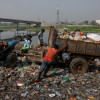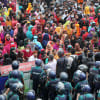Funding decarbonisation in RMG sector requires smart policies

According to a report by the Apparel Impact Institute (AII), $1 trillion is required globally to decarbonise garment supply chains, with a significant portion required for Bangladesh. The challenges are multifaceted, from a heavy reliance on fossil fuels to inefficiencies within factory operations. Addressing these issues requires both substantial funding and strategic planning. Bangladesh's current energy infrastructure heavily relies on fossil fuels, such as natural gas, oil and coal. This dependency not only increases carbon emissions but also strains the country's economy due to high import duties. Adding to the problem, the limited rooftop solar capacity of many factories restricts the use of renewable energy sources. As a result, Bangladesh requires significant investment to shift away from a fossil-fuel-dependent grid and towards renewable energy sources.
Another key barrier to decarbonisation in our RMG sector is the low energy efficiency in factory operations, particularly with steam systems. While Bangladesh has made strides in building green factories, these initiatives have not adequately addressed energy efficiency issues, which persist in equipment such as compressors, air conditioners and generators. Many of these machines are outdated and inefficient, leading to high energy consumption and increased fossil fuel reliance. Replacing these inefficient systems with energy-efficient alternatives could reduce the sector's overall energy demand and alleviate fossil fuel imports. However, this requires substantial investment.
Bangladesh has access to some funding facilities through organisations like the Infrastructure Development Company Limited (IDCOL) and the Bangladesh Bank. However, the use of these funds remains low due to complex accessibility requirements. High entry barriers, such as stringent eligibility criteria, deter many factories from taking advantage of these resources. Additionally, restrictions on foreign exchange loans by the Bangladesh Bank further complicate funding, particularly for renewable energy and energy efficiency projects. These restrictions, while meant to control foreign exchange outflows, ultimately hinder initiatives that could reduce fossil fuel dependence.
To address these challenges, Bangladesh has already secured a $250 million allocation from the Green Climate Fund (GCF) to support renewable energy development, but much more is required to achieve substantial decarbonisation. Foreign direct investment (FDI) and funding from international development agencies can be pivotal in bridging the financial gap. These funds should ideally be converted into low-interest loans in the Bangladeshi taka to ease currency exchange pressures on the economy. Establishing these as revolving funds, where funds are repaid and reused within the country, will minimise foreign exchange outflows and provide long-term financial support for decarbonisation projects. This structure would also alleviate concerns about currency fluctuations impacting loan repayment.
Global apparel brands, as key stakeholders in the supply chain, can play a significant role in financing supplier decarbonisation. Brands can directly contribute to the sustainability of the industry through revolving funds and can reduce the forex burden on Bangladesh by making financing more accessible to suppliers. However, to ensure that such funds are truly impactful, brands must recognise that their purchasing practices, pricing strategies and order visibility affect the suppliers' ability to invest in decarbonisation. Therefore, any funding initiative should also address these structural issues within the supply chain.
One effective way to boost the accessibility and affordability of funds is through derisking mechanisms. This approach makes the funds more attractive and affordable for local suppliers by reducing perceived risks, thereby encouraging greater participation. By derisking funds, the RMG sector can unlock more financing for renewable energy projects and energy efficiency upgrades.
According to the Fashion Producer Collective's white paper, alternative funding models that don't entirely rely on debt are critical for the sector's sustainability. This could include grants, equity investments or shared savings agreements where brands and suppliers split the cost savings achieved through energy efficiency upgrades. Moving away from a debt-centric approach allows more factories to engage in decarbonisation efforts without exacerbating financial strain.
Programmes such as the Future Supplier Initiative by The Fashion Pact aim to support suppliers in their decarbonisation journey. However, these programmes may lack the customisation necessary for Bangladesh's unique context. A collaborative approach, where brands, funders and manufacturers co-create methodologies, ensures the efficient use of funds and tailoring of projects based on the actual needs of the RMG sector. This cooperation will foster better results and avoid potential misallocation of resources.
Beyond factory-level improvements, Bangladesh must upgrade its national grid to accommodate renewable energy inputs. This requires not only funding but also policy reforms that enable investments in renewable infrastructure. Enabling policies will attract private investments, expedite renewable energy adoption, and facilitate the gradual shift from fossil fuels to more sustainable energy sources. Decarbonising our RMG sector is a significant challenge. The industry must secure large-scale funding, with an emphasis on availability, accessibility and affordability. By facilitating access to foreign and local funds, derisking investments, and promoting collaborative funding models, the sector can make meaningful strides towards sustainability. However, for these initiatives to succeed, brands, manufacturers and financial institutions must work together to create a supportive ecosystem.
Mostafiz Uddin is the managing director of Denim Expert Limited. He is also the founder and CEO of Bangladesh Denim Expo and Bangladesh Apparel Exchange (BAE).
Views expressed in this article are the author's own.
Follow The Daily Star Opinion on Facebook for the latest opinions, commentaries and analyses by experts and professionals. To contribute your article or letter to The Daily Star Opinion, see our guidelines for submission.

 For all latest news, follow The Daily Star's Google News channel.
For all latest news, follow The Daily Star's Google News channel. 










Comments